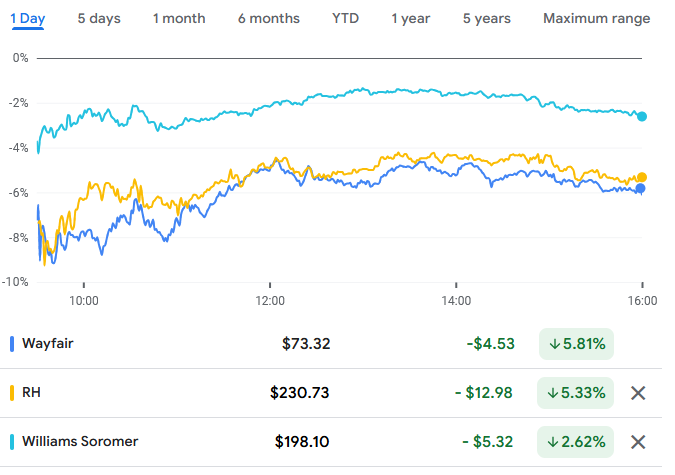Trump Launches Furniture Tariff Probe; Putting Pressure on Wayfair and Other Retailers
TradingKey - U.S. President Donald Trump announced via social media on August 22 the initiation of a 50-day "major tariff investigation" on imported furniture. The news triggered immediate stock declines for American furniture retail giants heavily reliant on imported supply chains.
In his statement, Trump declared: "Within the next 50 days, that Investigation will be completed, and Furniture coming from other Countries into the United States will be Tariffed at a Rate yet to be determined." He further stated that the move aims to "bring the Furniture Business back to North Carolina, South Carolina, Michigan, and States all across the Union."
.jpg)
White House spokesperson clarified on Monday that this investigation is not a new action, but rather a continuation and clarification of the "investigation into imports of lumber, wood products, and derived products (including furniture and cabinets)" already launched on March 1. The spokesperson noted that under this framework, furniture is classified as a derived product of lumber.
On Monday, Wayfair(W.US) shares fell 5.81%, RH(RH.US) shares declined 5.33%, and Williams-Sonoma(WSM.US) dropped nearly 3%.

Source: Google Finance
However, companies with higher domestic production like La-Z-Boy (LZB.US) and Ethan Allen Interiors (ETD.US) saw their stock prices rise on Monday.
For over a year, furniture retailers have suffered from declining demand for large items such as new sofas and dining tables. Analysts generally believe that persistently high interest rates have suppressed real estate transaction activity, with reduced home purchases directly weakening consumers' motivation to buy new furniture. Industry recovery largely depends on future interest rate cuts.
Wayfair CEO Niraj Shah recently acknowledged the market is "not in a strong position," but rather "feels like it's bottomed out, hovering at the bottom."
U.S. Department of Commerce data shows that total U.S. furniture imports reached approximately $25.5 billion in 2024, up 7% from 2023. Vietnam and China, as the two major source countries, collectively account for about 60% of import share. If high tariffs are ultimately implemented, leading furniture brands heavily dependent on imports will face significant cost pressure.
Facing potential tariff threats, Wayfair emphasized that its unique asset-light platform model (where most inventory is held directly by suppliers who are responsible for import logistics and pricing) provides strong flexibility.
“We continue to monitor the evolving trade landscape and remain confident in our ability to adapt as needed,” a Wayfair spokeswoman said Monday.



